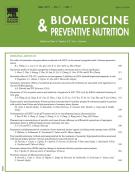Anti-inflammatory activity of low and high methoxylated citrus pectins - 01/03/13
 , Pavel A. Markov a, Galina Yu Popova a, Ida R. Nikitina a, Larisa Efimova b, Yury S. Ovodov a
, Pavel A. Markov a, Galina Yu Popova a, Ida R. Nikitina a, Larisa Efimova b, Yury S. Ovodov aAbstract |
The anti-inflammatory activity of the citrus pectins, CU701 and CU201, with low and high degrees of methylesterification (LM and HM), respectively, was studied after oral administration in mice using three models of inflammation: acetic acid-induced colitis, cytokine production by blood leukocytes in response to lipopolysaccharide (LPS) and endotoxin shock. Oral administration of either CU701 or CU201 24h before the infusion of acetic acid into the colon was found to prevent the progression of colitis. However, CU701 was found to decrease the adhesion of peritoneal granulocytes and their production of reactive oxygen species in colitic mice, whereas CU201 had no effect on granulocyte activity. Only CU701 was found to decrease tumour necrosis factor-α (TNF-α) release and to increase production of the anti-inflammatory cytokine interleukin-10 (IL-10) 24h after oral administration in mice. CU201 had no effect on cytokine production. CU701, but not CU201, was found to improve the survival rate in mice that were subjected to a lethal dose of LPS. The present study demonstrates that LM pectin would be a more efficient anti-inflammatory agent than HM pectin upon oral administration. LM pectin was found to inhibit both local and systemic inflammation, whereas HM pectin was shown to prevent intestinal inflammation.
Le texte complet de cet article est disponible en PDF.Keywords : Pectin, Degree of methylesterification, Anti-inflammatory activity
Plan
Vol 3 - N° 1
P. 59-63 - janvier 2013 Retour au numéroBienvenue sur EM-consulte, la référence des professionnels de santé.
L’accès au texte intégral de cet article nécessite un abonnement.
Déjà abonné à cette revue ?

